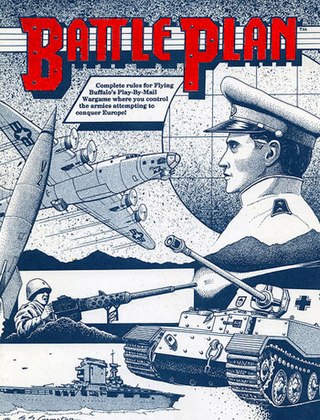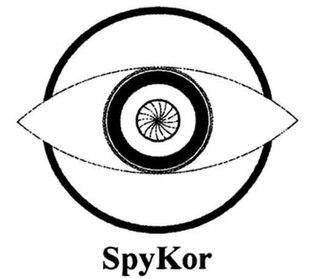Related Research Articles

A play-by-mail game is a game played through postal mail, email or other digital media. Correspondence chess and Go were among the first PBM games. Diplomacy has been played by mail since 1963, introducing a multi-player aspect to PBM games. Flying Buffalo Inc. pioneered the first commercially available PBM game in 1970. A small number of PBM companies followed in the 1970s, with an explosion of hundreds of startup PBM companies in the 1980s at the peak of PBM gaming popularity, many of them small hobby companies—more than 90 percent of which eventually folded. A number of independent PBM magazines also started in the 1980s, including The Nuts & Bolts of PBM, Gaming Universal, Paper Mayhem and Flagship. These magazines eventually went out of print, replaced in the 21st century by the online PBM journal Suspense and Decision.

Flagship is an independent magazine for gamers that was published from 1983 to 2010. Published bimonthly in the UK, it started in 1983 for play-by-mail game (PBM) players. The magazine also had a United States edition. In 2002, it expanded coverage to encompass other types of games such as boardgames, card games, computer games, and others. Nicky Palmer was the founding editor, with Carol Mulholland assuming editorial duties as of issue No. 70. The magazine ceased publication in 2010 after issue No. 130.

Legends is a turn-based, role-playing game with a medieval setting. It is currently published in English by Harlequin Games. Jim Landes—owner of Midnight Games, the game's first publisher—began developing the game in 1984, eventually publishing it in December 1989 as a play-by-mail (PBM) game after over a year of playtesting. The initial game comprised a module and game system built on the publisher's existing game, Epic, and was run briefly as Swords of Pelarn before publication as Legends. The first of multiple game modules was Crown of Avalon, which allowed up to 200 players per game. Demand by 1991 was "incredible" according to Bruce R. Daniel in White Wolf. Games could be lengthy, initially between three and ten years of play, settling into an average of three years by 2002.

Hyborian War is a play-by-mail game published by Reality Simulations, Inc. It takes place during the Hyborian Age in the world of Conan the Barbarian created by Robert E. Howard. The game has been continuously available for worldwide play since its inception in 1985 and has changed little in its overall format. It uses a computer program to adjudicate player orders. Although it relies on postal mail or email and has turnaround times which are relatively long for the digital age of video games, Hyborian War has remained active into the 21st century.
Midgard is an open-end, medieval fantasy play-by-mail game. It was published in 1984 by Time Space Simulations. Through 1996, the game passed through more than four different publishers, including Midgard USA. As of 2022, Talisman Games is the publisher. At initial publication, Midgard was computer moderated with partial human moderation.
CTF 2187 is a closed-end, computer-moderated, play-by-mail (PBM) game that was published by Advanced Gaming Enterprises in the 1980s. It involved teams of robots, of varying size and capabilities, battling on a hex-grid arena with the purpose of defeating the opposing team or their command post. Players assumed the role of a battle robot pilot. The game was tactically-focused, with combat action beginning on the first turn. Games lasted 5–10 turns, or about six months. Players began at the rank of cadet but could spend experience points earned from a completed game to increase in rank for future games, up to the rank of General.
Beyond the Stellar Empire is a play-by-email (PBM) game. Originally published by Adventures By Mail, BSE was an open-ended "space opera" with a single available game that began in playtesting in 1981. According to Stephen Marte, during the mid-1980s, like "Tribes of Crane and Midgard, BSE [was] the stomping ground of many of PBM's best power gamers". The game had two variants, one monitored by Game Masters who imposed artificial constraints, and another without constraints. Gameplay took place on a vast space stage where mega-corporations formed the dominant organizing framework, alongside various other groups that players could join to pursue tasks to advance, collaborate with other players, and progress to more senior positions such as space colony governors. Beyond the Stellar Empire placed #5 and #11 for Best PBM Game of the Year in 1987 and 1988, respectively, in Paper Mayhem, a magazine for play-by-mail games. In subsequent years, the game did not score well in Paper Mayhem reader ratings for playability, use, and product understanding. Beyond the Stellar Empire: The New System won the Origins Award for Best New Play-By-Mail Game of 1989.

Battle Plan is a closed-end, military strategy, play-by-mail (PBM) wargame. It was first published by Flying Buffalo Inc. in 1972, as one of the company's game offerings after Nuclear Destruction, the game that started the PBM industry in 1970. In August 2021, Rick Loomis PBM Games began publishing the game.

Victory! The Battle for Europe is a closed-end, military strategy, play-by-mail (PBM) wargame. The game was first published by Rolling Thunder Games, Inc. in 1991 after a period of initial growth in the PBM industry. The game centers on Europe while including parts of North Africa, the Middle East, the United States, and Canada. Forty players start each game with equal resources among countries, although geography causes differences between starting positions. Games last for about three years each. The game received positive reviews and rankings in the PBM magazine Paper Mayhem in the 1990s, including tying for second place in its Best PBM Game of 1995 list.
Fleet Maneuvers is a closed-end, space-based play-by-mail (PBM) wargame.
Out Time Days is an open-ended, computer moderated, science fiction, play-by-mail (PBM) wargame. It was published by Twin Engine Gaming in September 1985. Players role-played a time-traveller stranded on a planet called Kolob. Exploration, time travel, economics, and combat were part of gameplay. The game received generally positive reviews in various gaming magazines in the 1980s and 1990s, tying for 1st place in Paper Mayhem's Best PBM Game of 1997 list.
Krahlizek is a closed-ended, computer moderated, play-by-mail (PBM) wargame.
The Weapon is a closed-ended, science fiction, play-by-mail (PBM) game.
Epic is a computer-moderated, fantasy play-by-mail (PBM) game.
The Next Empire is a closed-end, computer moderated, space-based play-by-mail (PBM) wargame.
Dawn of the Ancients is a closed-ended, computer moderated, play-by-mail (PBM) wargame. It was published by Game Systems Inc., in August 1984 as its second offering after Earthwood. In 1988, KJC Games began offering the game in the United Kingdom.
Earthwood is a closed-ended, computer moderated, play-by-mail (PBM) fantasy wargame.
Venom is a closed-end, computer-moderated, play-by-mail (PBM) wargame. It was published by Game Systems, Inc. in 1989. Twenty players role-played demigods battling for supremacyby developing their position and winning a final battle. Demigod characters were highly customizable in the manner of spaceships for space-based PBM games. The game received generally poor reviews before the publisher revised the game in 1990 which improved the game according to one reviewer.

SpyKor is a closed-end, computer-moderated, play-by-mail game. A game of low-medium complexity, it was published by Sudden Asylum, of Pflugerville, Texas and playable by mail or email. The game had a near-future setting. Eight players acted as the CEO of massive corporations vying for global domination through varying means, including war, espionage, and economics. The game received generally positive reviews in gamer magazines in the 1990s.
References
- ↑ Palmer 1994. p. 14.
- ↑ Editors 1995. p. 9.
- ↑ Palmer 1995. p. 33.
- ↑ Wright 1996. p. 19.
- 1 2 3 Wright 1995. p. 8.
- 1 2 Rodgers 1995. p. 93.
- 1 2 Wright 1996. p. 20.